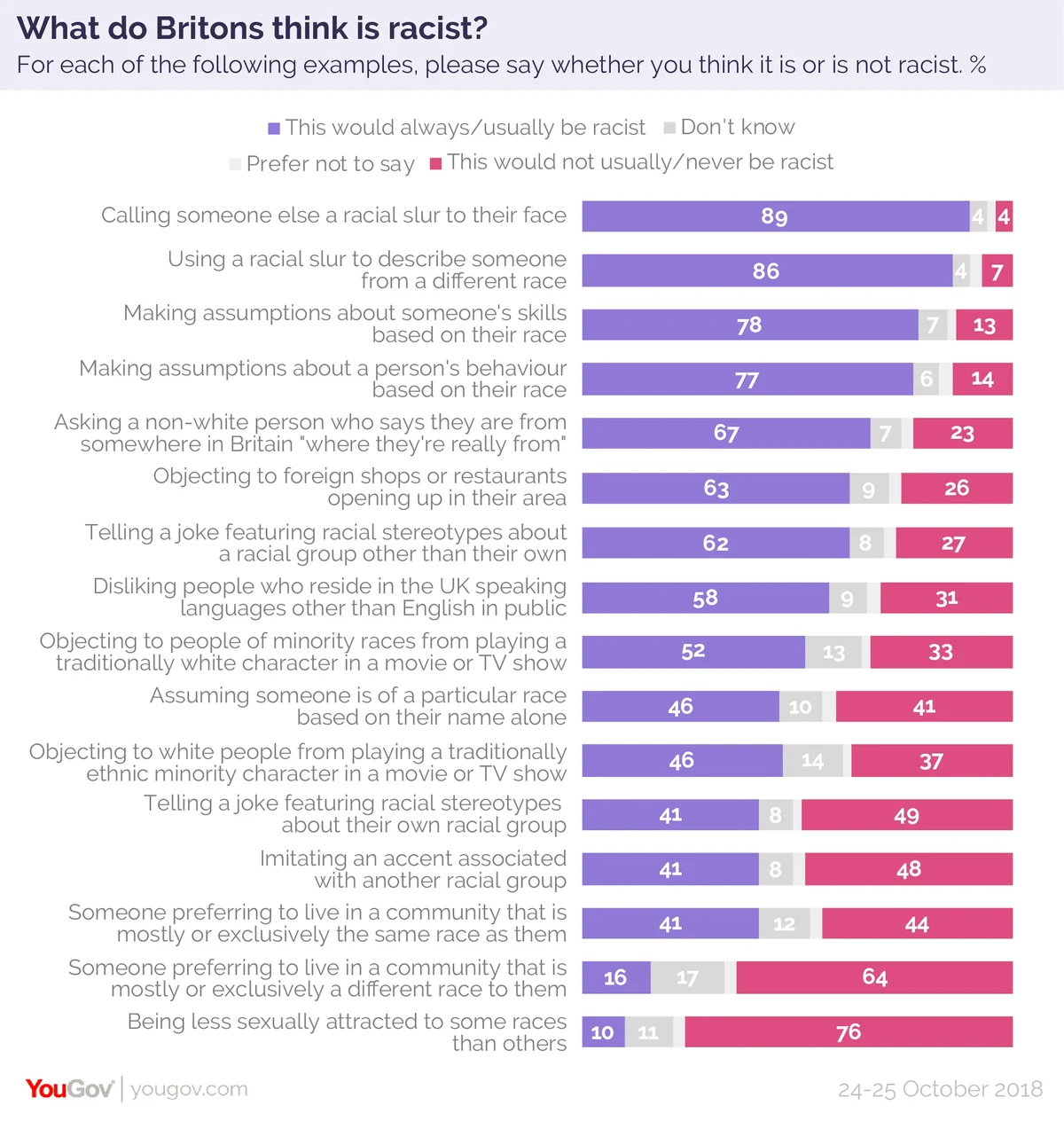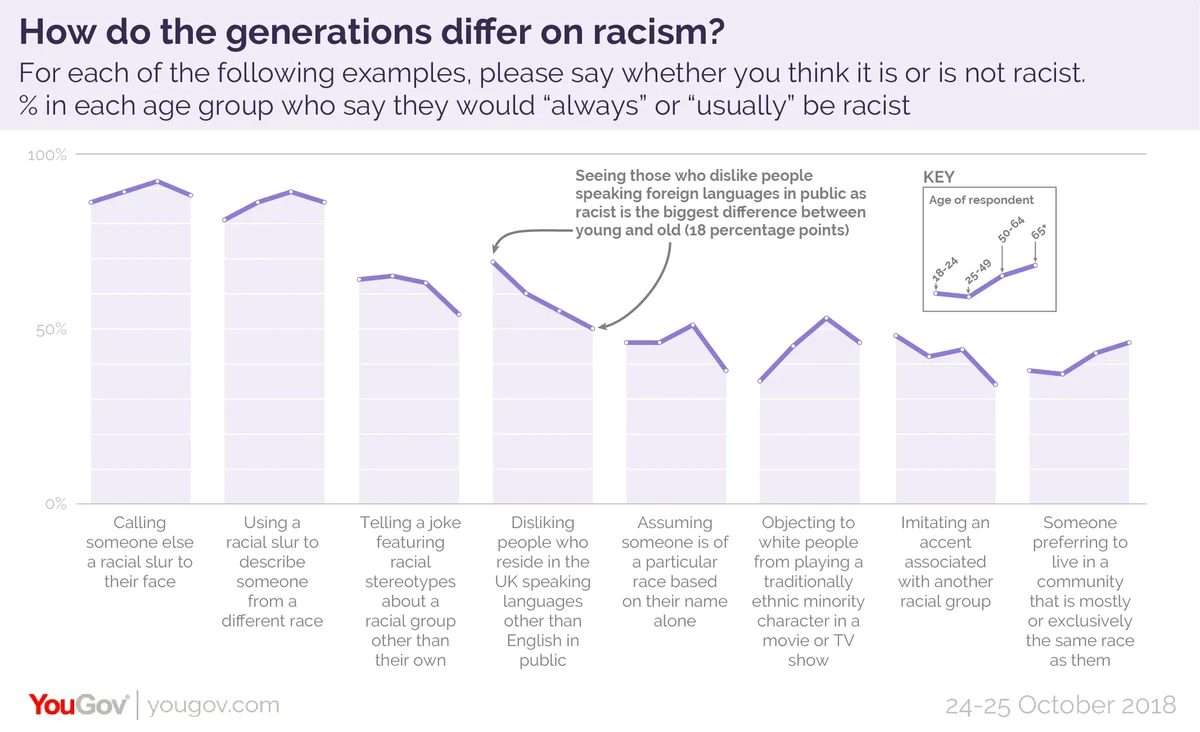YouGov takes 16 different actions and asks Britons: which ones are racist?
Is it racist for a café owner to publicly display a golliwog? We previously asked the British public when the issue arose last year and only 20% thought so. But for many race campaigners these toys cause great offence.
This prompted us at YouGov to explore: what does the British public think is racist? Now, in a new survey conducted in collaboration with The Guardian, we’ve put a series of 16 attitudes and behaviours to the public and asked whether or not they considered each to be racist.
A methodological note
It’s worth mentioning that these results are statistically representative of the British population as a whole, but that there are too few respondents from ethnic minorities to provide a representative view among these groups alone. YouGov has nonetheless proceeded with the survey because providing a deeper understanding of how Britons as a whole view racism may be useful in helping combat discrimination.
Racial slurs and assumptions based on race top the racist list
Uttering a racial slur to someone’s face tops the list of racist actions, with 89% of Britons saying it would “always” or “usually” be racist. Just 4% of people said they thought it would “not usually” or “never” be racist.
Similarly, 86% of Brits believe that using a racial slur to describe someone from a different race to a third party would always or usually be racist.
Making assumptions about a person’s skills or their behaviour based on their race also come near the top, at 78% and 77% respectively.
Other attitudes are much more divisive, however.
Assuming that someone is of a particular race based on their name alone is seen as always/usually racist by 46%, compared to 41% who believe it’s not usually/never racist. Concerns over bias – either conscious or subconscious – against names associated with ethnic minorities have prompted some employers to implement ‘blind’ CVs with names removed.
Brits are also split on someone imitating an accent associated with another racial group: such a behaviour is not usually or never racist to 48% of Brits, while being always or usually racist to a further 41%.
Comedians draw inspiration from day to day life, and many comedians from ethnic minorities frequently draw on their experiences as someone from a minority race. Sometimes this will involve using racial stereotypes in a humorous way.
Brits are split on the acceptability of such: if someone is telling a joke featuring stereotypes about their own race, 41% of people consider it always/usually racist, compared to 48% who say it would usually not or never be. If the stereotypes were about a different race to that of the person telling the joke, however, 62% of people see it as always or usually racist and only 27% as usually not or never racist.
A similar reversal in views can be seen over communities people prefer to live in. Close to two thirds of people (64%) said that someone preferring to live in a community that is mostly or exclusively a different race to them would not usually or never be racist – only 16% said it would usually or always be racist. However, if a person preferred to live in a community that is mostly or exclusively the same race as them, now 41% say this would always/usually be racist while 44% said it would usually not/never be racist.
Aside from the aforementioned preference to live in a community of a different racial group to you, only one other behaviour from our list was considered to not generally be racist by the majority of Britons: sexual attraction. Fully three quarters (76%) said that being less sexually attracted to some races than others was either not usually (32%) or never (44%) racist. Only 10% say that it would always or usually be racist.
The biggest differences between the generations
The survey also uncovers generational differences in perceptions of what does and does not constitute racism.
The biggest difference between young and old is in their attitudes towards people who dislike those who reside in the UK but speak foreign languages in public. More than two thirds (69%) of those aged 18-24 consider an attitude to always or usually be racist, compared to just half (50%) of Britons aged 65 plus.
The youngest Brits are similarly more likely than their eldest counterparts to see imitating an accent associated with another racial group as always/usually racist (48% vs 34%) and someone telling a joke featuring racial stereotypes about a different racial group to their own (64% vs 54%).
By contrast, older Britons are noticeably more likely to see objections to a white person playing a traditionally ethnic minority character – dubbed “whitewashing” by critics – as always or usually racist. One in three of Britain’s youngest adults (35%) see this as always or usually racist compared to 53% of those aged between 50 and 64.
On the most commonly recognised forms of racism, however, young and old are in agreement. Approaching nine in ten 18 to 24 year olds (86%) see calling someone a racial slur to their face as always or usually racist, closely mirroring the 88% of 65+ year olds who feel the same way.
Photo: Getty
This study also looked at perceptions on how prevalent racism is in British society and to what extent people think minorities are subject to greater discrimination. You can read the article on those results here










